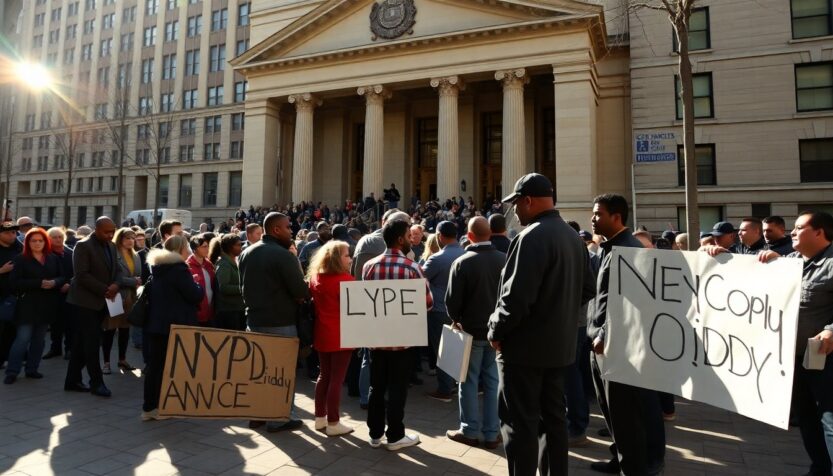Outside the courthouse, the vibrant sounds of an early hit from Bad Boys Records resonated, marking a significant day in legal history. Signs mocking the NYPD adorned the streets, with one reading ‘NYPDiddy.’ Nearly two years had passed since Sean ‘Diddy’ Combs first faced allegations of sexual and physical abuse, sparking public scrutiny, a criminal trial, and extensive gossip within the hip-hop community. He was now set to receive a sentence for two counts related to prostitution, with a judge ultimately determining he would spend over four years in prison.
The atmosphere on that Friday morning was electric, drawing one of the largest crowds since the trial began. However, despite the spectacle, the proceedings often disappointed those following the case. Given Combs’s longstanding fame and the glittering world he inhabited—illustrated by extravagant events like his Hamptons White Parties—many observers hoped the trial would reveal the darker side of celebrity life. Instead, the focus remained primarily on the testimonies of two women: Casandra ‘Cassie’ Ventura, his former girlfriend who initially filed a lawsuit before settling, and an unnamed witness. Their harrowing accounts detailed a troubling cycle of abuse and addiction intertwined with the male escorts Combs allegedly hired for elaborate sexual escapades, commonly referred to as ‘freak-offs.’
Public reactions and media coverage
Armon Wiggins, a prominent YouTube commentator from Los Angeles, expressed his initial high expectations for the trial. He traveled to New York, funded by his viewers, eager to witness the proceedings, particularly after covering the previous trial of rapper Tory Lanez, who was convicted of shooting Megan Thee Stallion. Wiggins noted the significance of the trial, stating, ‘We hadn’t had such a big trial for hip-hop culture since OJ.’
As the trial progressed, independent media personalities flocked to the Daniel Patrick Moynihan Courthouse, setting up iPhone tripods to broadcast their perspectives live. Wiggins found himself at the forefront of this coverage, especially after the verdict was announced. In a controversial celebratory act, he poured baby oil over himself—a nod to a product linked to Combs during the trial—leading to widespread media attention. Although he later apologized on social media, his actions highlighted the trial’s cultural impact.
Perceptions of the trial
The courtroom drama predominantly revolved around the emotional testimonies of Ventura and Jane Doe. Wiggins summarized his peers’ views succinctly, stating, ‘This was really about his freaky sex life.’ As the trial progressed, attitudes shifted, with many detractors of Combs expressing indifference towards the case’s implications. ‘Clearly the jury thought the same thing,’ he remarked, reflecting a growing disconnect between the case’s gravity and public interest.
Sentencing and courtroom dynamics
In July, a pivotal moment arrived when Combs was acquitted of the most severe charges, those that could have resulted in a life sentence. Overcome with emotion, he dropped to his knees in gratitude. However, the verdict did not erase the reality that he still faced significant consequences for two violations of the Mann Act, which prohibits transporting individuals across state lines for prostitution. Prosecutors sought a sentence exceeding 11 years, while the defense argued for a swift release of just 14 months, accounting for his previous year spent in a Brooklyn federal jail.
After a grueling seven-hour hearing, Judge Arun Subramanian, appointed by President Biden and a former clerk for Ruth Bader Ginsburg, handed down a sentence of just over four years. Leading up to the sentencing, both the prosecution and defense presented compelling arguments illustrating the chaotic trajectory of Combs’s life.
Character assessments and conflicting views
Among the testimonies, rapper Yung Miami, born Caresha Brownlee, submitted a character letter on Combs’s behalf. She reminisced about her first Met Gala experience with him, emphasizing his commitment to uplifting Black individuals and ensuring their visibility in spaces where they have historically been marginalized. Conversely, Deonte Nash, a former stylist for Combs, offered a harsher critique, stating that many individuals suffered due to Combs’s desire to protect his image.
On the day of sentencing, a visibly aged Combs entered the courtroom dressed in a white sweater, mindful of his family’s presence. After the attorneys presented their cases, Combs took the opportunity to address the judge, marking his first public comments on the case since Ventura’s initial lawsuit. He expressed gratitude for the chance to speak, framing his remarks as an apology to Ventura and Jane Doe, acknowledging his past behavior as ‘disgusting, shameful, and sick.’
His ten-minute statement resonated in the courtroom as he acknowledged the turmoil surrounding him. ‘No matter what anybody says,’ he stated, ‘I know that I’m truly sorry for it all.’
The aftermath
The atmosphere on that Friday morning was electric, drawing one of the largest crowds since the trial began. However, despite the spectacle, the proceedings often disappointed those following the case. Given Combs’s longstanding fame and the glittering world he inhabited—illustrated by extravagant events like his Hamptons White Parties—many observers hoped the trial would reveal the darker side of celebrity life. Instead, the focus remained primarily on the testimonies of two women: Casandra ‘Cassie’ Ventura, his former girlfriend who initially filed a lawsuit before settling, and an unnamed witness. Their harrowing accounts detailed a troubling cycle of abuse and addiction intertwined with the male escorts Combs allegedly hired for elaborate sexual escapades, commonly referred to as ‘freak-offs.’0






